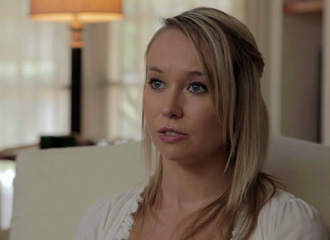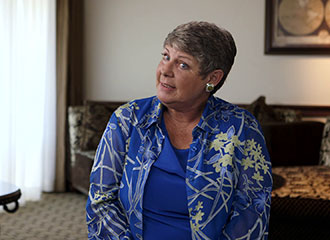“I Never Realized That I Needed Help Too.”
5-minute read
“I Never Realized That I Needed Help Too.”
5-minute read
It wasn’t until after her husband got home, safe and sound from his deployment, that Susan fell apart. A U.S. Army Veteran herself, she headed to her local VA and found someone to talk to.
“Don’t be afraid to ask for that help,” Susan says now. “Because that help is really important.”
Oct. 26 marks the National Day of the Deployed, honoring the men and women who are serving this country — away from their homes and families. But we also recognize those families of the deployed who are making sacrifices and dealing with anxieties of their own.
Jason, an Air Force sergeant and combat Veteran, tells other Service members and Veterans: “Just be aware that your family is back home … and there is a potential for some problems to arise. There’s a void when you’re gone and they miss you. They’re concerned about you.”
The times leading up to, during, and following deployments have an impact on spouses, children, parents, and other loved ones — both directly and indirectly. VA offers insights and resources to help them cope. Here are a few tips:
- Create a deployment checklist to help prepare for your deployment or a family member’s deployment. This plan will help track what needs to be done, keep tasks from seeming overwhelming, and reduce some of the uncertainty surrounding the events to come.
- Address relationship problems as soon as you sense them coming on. This could mean creating a communication plan, talking to others who have experienced similar issues, finding a social event to experience together, or getting counseling.
- Signs of problems include feeling distant, easily losing patience with family members, and drinking alcohol more often. Recognize the signs that you might need some support.
Below, three military spouses share their stories.
“It was like looking in a mirror.”
Rebecca was sitting in church with her husband when he leaned over and said he needed to go find a drink of water. He was gone for almost a half-hour.
“I knew that he was having some sort of experience,” she says. “He came back right at the end, just before church finished, and he said he was having flashbacks.”
Rebecca admits that she didn’t know how to support her husband. She wasn’t even sure how to support herself. But together, the couple eventually attended a camp for Veterans and the people in their lives. There, they sat in small groups of people with similar experiences — and talked.
“I never thought that that was something that I needed to do, because I’m the one that supports him,” Rebecca says. “But I never realized that I needed help too.”
As she sat and listened to the stories of others, she almost began to cry: “It was like looking in a mirror.”
Confronting a Unique Challenge: The Impact of Deployments on Children
Six months after giving birth to her daughter, Nicole deployed to Korea. She didn’t return until six months after that.
“She didn’t know me. She wouldn’t come to me and I understood,” Nicole remembers. “But it was gut-wrenching. Very gut-wrenching. I’ve never been afraid to get on a plane and go anywhere, knowing I was going to get shot at, but that felt horrible.”
In the years that followed, Nicole began to realize the impact of her and her husband’s deployments on their two children. “My daughter kind of became withdrawn a lot; my son acted out a lot. Both very intelligent kids. … But at that time, they didn’t understand why we were never there.”
Hear Nicole's Story.
“We Just Needed a Little Help”
During Operations Desert Shield and Desert Storm, Susan remembers that some of the wives of sergeants and colonels were asked to attend training on how to give death notifications. There was an expectation at the time, she says, that there weren’t going to be enough chaplains to cover all the casualties.
“So we had to go through training and learn how to come and tell you that your husband or wife had died,” Susan says. “And I will tell you: I don’t know how other people are, but I’m really good in a tight pinch. But after it’s over with, I fall apart. That’s when I decompress.”
Beyond her own challenges, Susan noticed changes in her husband when he returned. He was staying up late and jumping at noises, and he avoided certain seats in restaurants.
“I had to package my suggestion to seek counseling in a very delicate way,” Susan says. “First of all, not to offend him; not to blame him; not to cause him to think there was something wrong with him — that there was something wrong with us. For some reason we couldn’t be that cohesive unit like we used to be, so maybe we just needed a little help.”


